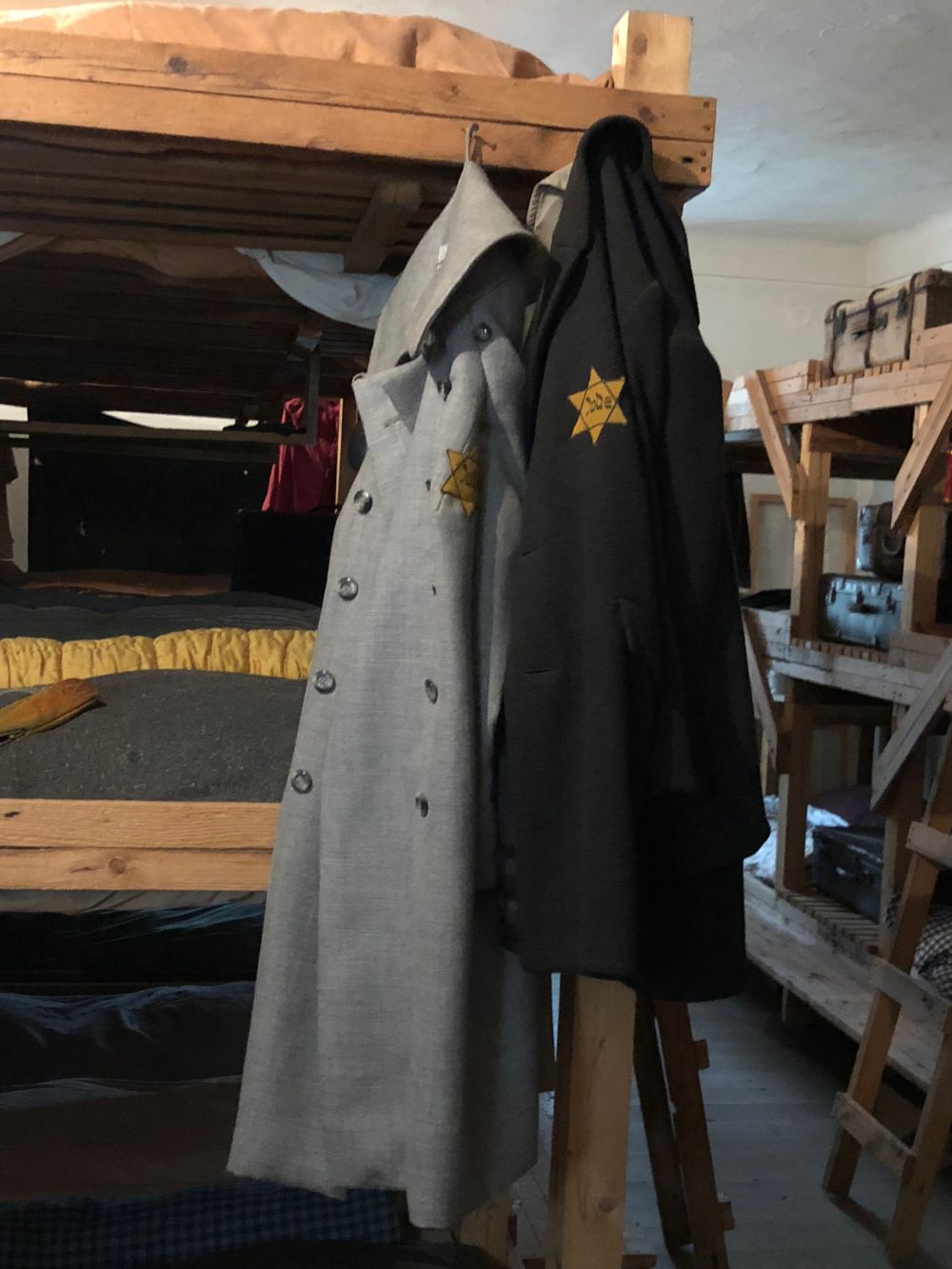In Memoriam
I wrote this post two years ago from a dimly lit room in Prague after visiting a Jewish ghetto and military prison. I am sharing it today on the 75th Anniversary of Auschwitz Liberation. As I looked through my pictures, all the memories (and the tears) came flooding back.

This blog post was originally shared as part of my Explorations class with Columbia Theological Seminary. We were touring and learning about the church in Central Europe.
I share it here with you so I will remember. I pray we will all always remember. And I pray that replaying the memories moves us to make this world a beautiful, more peaceful, more just place.

original publication date: January 9, 2018
Today we visited Terezín, the Jewish ghetto and military prison. Terezín is located north of Prague, and we took about an hour bus ride to get there. This place was never a death camp; there were no gas chambers here. (They did start building a gas chamber here, but it never was finished). However, it was a holding area for Jews before they were sent east to the gas chambers, many to Auschwitz, Bergen Belsen, and Dachau, and Buchenwald.

The city was originally built in the late 1800s. It’s enclosed with a border wall and also houses a prison. The prison was originally built to house political opponents of the monarchy. During WWII, the prison mostly housed political prisoners who disagreed with the Nazi regime. Some Jews who were housed in the ghetto could have gone to the prison if they caused problems, but most of the ones who attempted to escape or disobey orders were transported directly to a death camp.
During the years that civilians lived in Terezín, there were about 7,000 inhabitants. Jews began being transported in during 1941. It took 6 months for civilian residents to move out and Jews to move in. At one point during the war, there were 58,000 Jews living in the same space that once comfortably housed 7,000 people. Over the course of WWII, over 155,000 Jews came through Terezín.
As one can imagine, the living conditions were horrific. 35,000 people died at Terezín because of poor sanitary conditions, disease, and killings. Women who became pregnant were forced to have abortions. Surgeries were performed with razor blades and no anesthetics.



In the prison – known as the Small Fortress – political prisoners were often tortured at the pleasure of the SS officers in charge. Living conditions in the prison were horrific as well. We saw the showers that prisoners used (only once a week, and sometimes the officers cut off the water too early out of spite) as well as machines used for clothing sanitation. When prisoners got out of the showers, they had to put their sanitized clothing on – still wet- and spend time in the yard. During the winter months, it would be freezing. If a prisoner made a guard mad, he was often thrown naked into the courtyard after a shower.


Prisoners were made to run back and forth across the courtyard, just to wear them out. They were killed on a shooting range or on the gallows…


Prisoners could get packages, which sounds pleasant and merciful. However, one day the commandant in charge decided that everything received in packages had to be put into the day’s soup: all the food, sweet and salty and everything in between, but also things like cigarettes and needles as well…
We saw a wall with names of children under the age of 15 who were housed at Terezín. We also saw pictures some of them made. They had a teacher who was an artist, and she encouraged them to draw. She even held an exhibit of their drawings in the basements of one of the buildings. She was eventually transported to Auschwitz and died there. Over 18,000 children under the age of 15 were sent to Auschwitz from Terezín during WWII.



Those are the facts. These are the feelings: today absolutely broke my heart. We were kind of rushed through the museum as we had so much to see, but I wanted to spend as much time as possible in the room with the children’s names. I wanted to run my hand across each one and say each name out loud. Each of those was someone’s baby, someone’s whole world, someone’s heart walking outside her body… Each of those children was lovingly taught to talk and to walk, had lullabies sung to them, and were cherished children of God. To know that so many of them were forced to live in such horrible conditions, and that so many of them were transported to death camps and didn’t survive because they were often too young to work. My heart ached to linger over those names, to whisper them, to shout them, to acknowledge their existence. They deserve to be remembered. I wanted to honor their memory.
Standing in the prison, my heart seemed to miss a beat every time we saw something new. To imagine the atrocities that happened there, to sit in the middle of a cold, dark room and wonder about the cries that must have echoed out from that space, the deep wailing of despair that carried in the night, the stifling sound of silence from being too tired or too depressed or too enraged or too withdrawn… I could sense the terror and the desperation.
Walking down the streets of Terezín, I began to imagine what it might have been like for the Jews living there. How some of them must have walked out of fear, how some of them must have been tired, how some of them lamented the lives and families they had lost… I wondered what it was like for the people who moved into Terezín after the war ended, the families that inhabited the apartments that used to be ghettos, the people who set up family homes in places of former filth and human violation. What did they sense when they moved in? What did they find hidden after all evidence of the Jews was gone? What haunted their dreams?
My heart was broken today for all the hearts that were broken then. For all the hearts that continue to break. For all the ways we hate and hurt each other. For the senseless violence. For atrocities and evils and destruction of human life. I have wept, I am weeping, and I will continue to weep for this world.

“Blessed are those who hunger and thirst for righteousness, for they will be filled.” Matthew 5:6
[2020 insert: On this trip, we were asked to write our blogs based on lectionary verses for the day, and this was that day's lectionary verse. I have a variety of feelings bubbling up about using a New Testament verse as a lens through which to view the horrors of the Holocaust. Know that I am very aware that this can feel problematic and am currently wrestling with it. Do I leave it, because Jesus was Jewish? Because I believe his heart breaks even more than my own did touring that day? Do I change it, and pull something from the Hebrew Bible with a similar sentiment? There are many to choose from: Psalm 63:1, Isaiah 55:1, Jeremiah 31:25, to name a few... I am choosing to leave the Matthew verse here, with this edit, as it did influence the way I wrote this blog post. Read on, if you are able, knowing I wish heartfelt love and support for my Jewish family, friends, and neighbors.]
This verse breaks my heart too. For those in Terezín, in other places during WWII, and all over the world who hunger and thirst for righteousness. Counting the numbers of those who died senseless deaths in the name of evil, my heart questions this verse. Were they filled, Lord? It is so easy to become hopeless standing in a place like Terezín…
But then I looked around at my traveling companions, and I thought about all of the people who visit these places and learn about the tragedies of genocide, and I think about how our group wants this world to be better, how I want this world to be better, how so many people want this world to be better and are actively working towards it… and I pray to God that through honoring the victims’ memories, they will be filled. That if we as a world try to do better, they will be filled with righteousness.
We heard so many stories today, so many I haven’t shared with you, but let me leave you with this…
“Blessed are those who hunger and thirst for righteousness, for they will be filled.”
Blessed are Eva, and Petr, and Regina, and Leo, and Hana…
Blessed are those who survived…
Blessed are those who perished…
Blessed are those whose names are inscribed on walls…
Blessed are those who seek to do justice in their names.
Amen.
